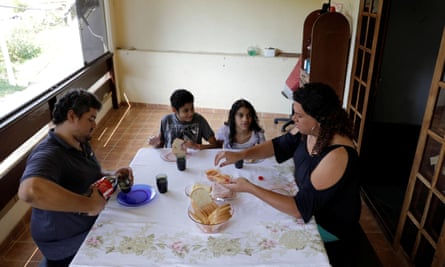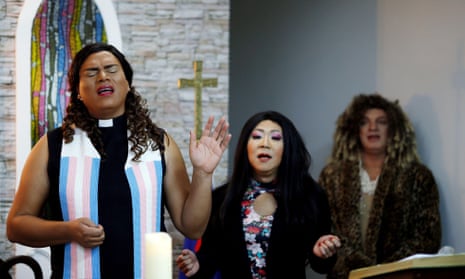Desperate calls from LGBTQ+ youths contemplating suicide or from their parents after they have made an attempt on their lives often punctuate Alexya Salvador’s day. When they do, she drops everything to talk.
As a transgender woman, she recognises the anguish in their voices. “I feel their pain in my body because I went through this,” she says. “My family went through this.”
As the first transgender reverend in Latin America at the Metropolitan Community Church (MCC), she hopes she can use her faith to help. She understands the struggle to reconcile religion and identity, especially in Brazil, where Christianity reigns and the church is often far from a safe space for those who are LGBTQ+.
But Salvador wants to change that. Long before she became a pastor, it was her faith that provided her with solace and strength. Now, it’s also a way for her to give others in her community the support they need.
According to the National Association of Travestis and Transexuals of Brazil (Antra), 175 trans people were killed in Brazil last year, the highest number since the organisation started collecting data. All were trans women and most, like Salvador, were black and poor. And this year, the violence has continued. In one case, a trans woman was tied up in the boot of a car and beaten by two men with a piece of wood while police watched.
As a pastor, Salvador often counsels trans women who have been through similar situations. The MCC where she got her start is located in central São Paulo, and many members of her congregation are homeless and work on the streets, making them vulnerable to the types of prejudice and violence that have taken so many lives.
While part of her role is to preach at church services, what she finds most rewarding is talking to those who come to the MCC, finding out what they need – be it spiritual guidance or a hot meal and a safe place to sleep – and making sure they get it.

Salvador has always been a religious person. When she was seven, she begged her parents, who were non-practising Catholics, to take her to church.
Bullying at her school was relentless. Church, she thought, was somewhere she could go where she would not be attacked.
There, she found her place. Her catechism teacher saw the connection she had with her faith and the dedication she had to learning about her religion, and asked her if she, too, wanted to teach.
“It was the first time someone invited me to do something and didn’t laugh at me,” Salvador says. “It was a moment where I felt important, where I felt useful.”
When she was young she wanted to join the priesthood – it would be years before she would transition or even realise she was a woman – and joined a seminary. She also liked attending events put on by the charismatic Catholic community known as Canção Nova, which has a TV channel that broadcasts Catholic programming across Brazil. But it was there, she says, that she realized “this environment was toxic for me.” The comments about LGBTQ+ people being “an abomination” were too much.
The priesthood, she decided, was not for her. After leaving the seminary, Salvador continued to attend church and participate in its activities; she still loved teaching and singing during Mass.
“I said to myself, ‘I’m not Catholic anymore, I don’t want to serve the Christian faith anymore because it’s a faith that oppresses me,’” she says. “I severed ties with the institution, with the church, but never with my faith in God, in Jesus.”
A year and a half later, a Google search led her to the MCC. Founded by the Rev Troy Perry in Los Angeles in 1968, the church prides itself on being a welcoming and affirming ministry to those who identify as LGBTQ+. When Salvador and her now-husband Roberto decided to see how they could get married as a gay couple, they discovered that the MCC had a church in São Paulo.
In June 2010, they were one of 12 LGBTQ+ couples married by the church in a group wedding.
They started attending Sunday services at the MCC, and found a community there that made them feel welcome. But Salvador was struggling. She knew that she was transgender and was terrified that telling Roberto would mean losing him.
But Roberto stood by her, supporting her as she started hormone therapy, replaced her wardrobe and changed her name.
“It was like he did this transition too,” she says.
Along with Roberto, it was the MCC that gave her the strength to tell her parents, colleagues and students about her transition. When she was invited to become a deaconess, she readily accepted.
“The panic that lived in my head until I discovered the MCC was that I would go to hell, that I was God’s mistake,” she says. “While studying theology, I learned that I have flaws like all humans do, but being a trans woman is not one of them.”
With her first dream now a reality, Salvador’s second became her focus. The oldest of three siblings, she had always wanted to have three children of her own. Once again, she and Roberto turned to Google. They found out she would be the first trans woman in Brazil to adopt.
It took six months for the judge to say yes. The process was not easy, and Salvador knew it would involve facing transphobia, but she now has a son and two transgender daughters.

Raising her family in her hometown of Mairiporã, Salvador hopes to start her own MCC congregation. With permission from the church, the process began before the pandemic, with the search for a location.
Since Covid-19 swept through Brazil, the church has gone online, with some services still provided in person, particularly because many of the MCC’s parishioners in São Paulo live on the streets or in shelters and rely on the church for basic necessities and to stay safe.
But for now, Salvador’s parishioners in the town of just over 100,000 meet virtually. It may not be the same as having a physical space, but it is still one they can call their own. For those who are religious in the LGBTQ+ community, like Salvador, it’s a rarity they hope can change.
“The Christianity that Jesus brought forward was for all people,” she says. “And being a part of the church today, as a trans woman, is a reclamation of the space that we know is also ours.”
Contact Samaritans for free from any telephone on 116 123. You can call even if you have no credit on your mobile, and the number will not show up on phone bills. You can also email jo@samaritans.org or visit samaritans.org to find your nearest branch, where you can talk to a trained volunteer face to face.
In the US, the National Suicide Prevention Lifeline is 1-800-273-8255. In Australia, the crisis support service Lifeline is 13 11 14. Other international suicide helplines can be found at www.befrienders.org.
